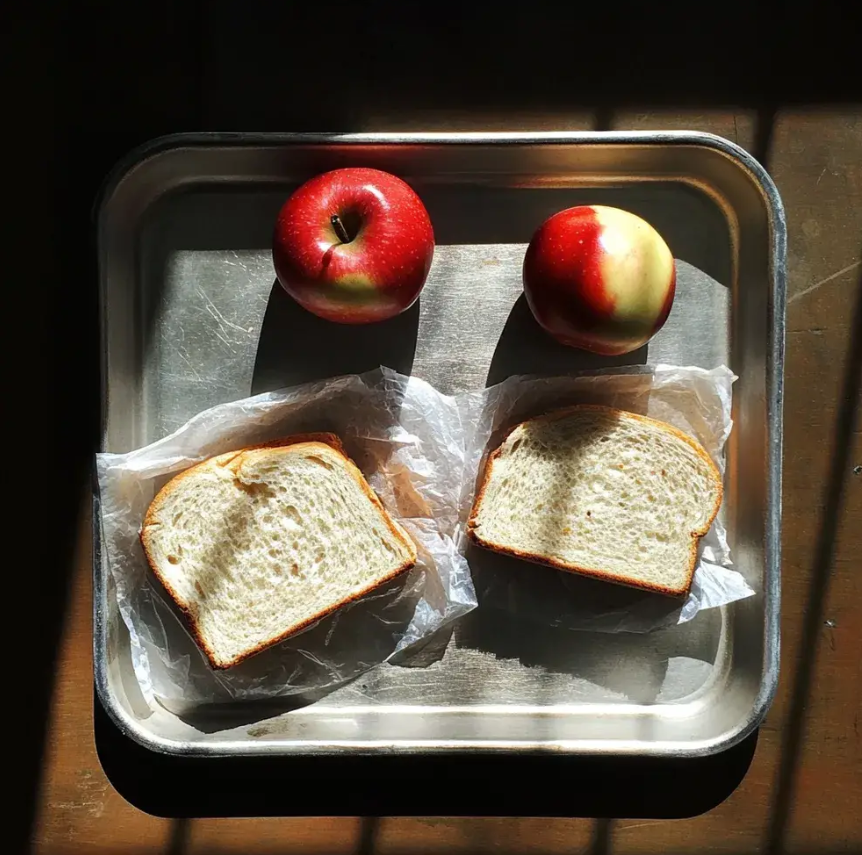Uncovering Hidden Burdens
Throughout his fifteen-year tenure as a school principal, Mr. Lewis had learned to trust his instincts. He knew that behind the polite smiles and quiet obedience of his students, many carried burdens that adults often overlooked. Some children displayed their struggles overtly, while others hid them behind an air of quiet resilience. One such child was Mia—a gentle, unassuming nine-year-old with dark braids neatly tied with blue ribbons, who blended so easily into the background that her pain nearly went unnoticed.
It was during a busy afternoon at school, as students prepared to leave the cafeteria after lunch, that Mr. Lewis first observed something unusual. Amid the bustle of children and the clatter of trays, he noticed Mia meticulously gathering leftover food. Not in a hasty or disruptive way, but with deliberate care—unwrapped sandwiches, untouched fruit, and unopened milk cartons were quietly tucked into her small, purple backpack. This wasn’t the behavior of a mischievous child looking for extra snacks; it was something more solemn, more deliberate. And it prompted Mr. Lewis to wonder: What could be so important that she had to collect every scrap of food?
II. The First Clues: A Principal’s Concern
A. Observing the Unusual
In the days that followed, Principal Lewis’s concern grew. He had seen many children struggle with hunger or neglect, but Mia’s actions struck him as different. She was always careful and methodical. Unlike other students who might impulsively grab extra food when available, Mia seemed to be gathering it with a purpose. He recalled that quiet children often bore silent burdens—wounds that were invisible to the casual observer.
Mia’s behavior could not be dismissed as mere thievery. There was a certain sadness in her careful collection, as though each leftover represented not just a snack, but a hope for sustenance later on—a small token of survival. That day, as the final bell rang and students streamed out of the cafeteria, Mr. Lewis resolved to speak with her.
B. A Gentle Confrontation
Later that afternoon, as the corridors emptied and the echoes of children’s chatter faded away, Mr. Lewis found Mia alone in a quiet corner near the exit. Approaching her with the gentle authority he was known for, he crouched down beside her and addressed her softly:
“Mia,” he said, “I noticed you taking food from the cafeteria. Can you tell me why you do that, sweetheart?”
Her small hands clutched the straps of her backpack tightly as she hesitated before answering. After a few moments of silence, with eyes cast down toward the floor, Mia replied in a timid voice, “My mom works really hard, but sometimes we don’t have enough to eat.”
That simple answer, though incomplete, confirmed Mr. Lewis’s suspicions. Mia’s words revealed that her family might be struggling in ways that went far beyond what was visible at school. Yet, there was something in the way she spoke—a quiet determination mingled with fear—that suggested she wasn’t telling the whole story. Mr. Lewis’s decades of experience with children told him that when a child confides something like this, there is usually more beneath the surface.
III. The Decision to Follow: A Principal’s Resolve
A. Reflecting on a Lifetime of Experience
That evening, as Mr. Lewis sat at the dining table with his wife, Audra, his mind kept returning to the image of Mia carefully stashing leftover food into her backpack. Their home was filled with the comforting aromas of roasted chicken and rosemary, yet his thoughts remained with the little girl and her silent struggle.
Audra, perceptive as ever, noticed his distant gaze. “You’re quiet tonight,” she remarked gently. “Is it one of your kids?”
He sighed, rolling his shoulders as he admitted, “There’s a student, Mia. She’s nine, quiet, always keeps to herself. Today, I saw her taking extra food from the cafeteria—unwrapped sandwiches, apples, milk cartons… it was like she was saving it for later.”
Audra listened intently as he described the scene. “Was she eating it later?” she asked softly.
“No,” he replied, shaking his head. “It wasn’t like she was snacking during class. It was like she was collecting it, as if she needed to store it somewhere safe. I can’t shake the feeling that there’s something more to it.”
Audra’s eyes softened with understanding. “If your gut is telling you something’s wrong, then you should listen,” she said, reaching out to squeeze his hand. “What are you planning to do?”
Mr. Lewis hesitated for a moment, the weight of his decision apparent in his voice. “I think I need to follow her after school tomorrow,” he admitted. “I need to find out where she goes and what she does with the food she collects. It might be nothing, but… I have a feeling it’s serious.”
Audra’s quiet support bolstered his resolve. “You’ve always had a knack for noticing the little things that matter,” she assured him. “Just be careful, and remember—sometimes a child doesn’t know how to ask for help. You might be the only one who can.”
IV. The Trail Begins: Following Mia
A. The Final Bell and a Quiet Departure
The next day, as the final bell rang, students poured out of the school like a tide. Mr. Lewis, keeping a discreet distance, observed as Mia gathered her things and headed toward the school exit. She walked in a small group with other children, but her pace was measured, almost as if she were following a predetermined path. Determined to uncover the truth, Mr. Lewis followed at a respectful distance, careful not to alarm her or intrude upon her privacy too soon.
Mia’s route took her away from the familiar surroundings of her neighborhood. Instead of heading directly home, she veered off onto a quieter street, away from the main thoroughfare. Mr. Lewis’s heart began to pound as he trailed behind her, navigating the backroads and quiet lanes that led out of town.
B. Discovering the Unexpected Destination
After several blocks, Mia’s pace slowed near a cluster of old, abandoned buildings. One house in particular caught Mr. Lewis’s attention—it was weathered and worn, its paint faded and windows boarded up. The building stood apart, a relic of the past that seemed almost forgotten by time.
Mia stopped at the edge of the property. With a careful glance around, she unzipped her backpack and retrieved the food she had collected: sandwiches, apples, a carton of milk. In a deliberate, almost ritualistic manner, she placed the food inside a rusted metal mailbox attached to the house. Then, after a few moments of lingering by the door, she knocked twice and quickly ducked behind a nearby bush, disappearing from sight.
Mr. Lewis, hidden in the shadows, felt his pulse quicken. Who was this mysterious recipient of Mia’s secret offerings? And what did it mean that a little girl was so determined to provide for someone in this forsaken place?
He crept closer, peering through the cracked door. A moment later, the door creaked open slightly, and a thin, unshaven man stepped out. His eyes were hollow and tired, his clothing hanging loosely on his frame. He reached into the mailbox, retrieved the food, and without a word, disappeared back inside the dilapidated house.
Mr. Lewis’s mind raced. He had seen enough struggling children in his fifteen years to know that Mia’s actions were not random. He needed to learn more.
V. The Question of Truth: Confronting Mia
A. The Next Morning in the Principal’s Office
The following morning, Mr. Lewis called Mia into his office. The room was quiet and softly lit by the morning sun filtering through the window. Mia sat hesitantly, her small feet barely touching the floor, her eyes darting between the principal and the door as if seeking an escape.
“Good morning, Mia,” Mr. Lewis began in a gentle tone, his voice both firm and compassionate. “I need to ask you something important.” He leaned forward, his expression earnest yet kind. “Can you tell me about the food you take from the cafeteria? And… where do you put it?”
Mia’s eyes widened with uncertainty. For a moment, silence filled the room. Then, in a soft, trembling voice, she replied, “I… I take it to a house. A man lives there. His name is Daniel.”
Mr. Lewis felt a chill run down his spine. Daniel. The name stirred memories of a house fire that had once shaken the community. He recalled that years ago, during a devastating blaze, a firefighter had risked everything to save lives—a man whose bravery had become the stuff of local legend.
“Daniel?” Mr. Lewis echoed, careful not to reveal the full extent of his shock. “Can you tell me a little more about him?”
Mia looked down, her voice barely above a whisper. “My mom told me he saved her, too. He saved me once… I wanted to thank him, but he told me to go away. I keep coming back because… I don’t want him to forget. I leave food, hoping he’ll know that someone cares.”
Her words, spoken with a mixture of sorrow and determination, left Mr. Lewis with a heavy heart. This little girl, who had always seemed so quiet and reserved, was carrying a secret of immense importance—a secret act of kindness born of loss and a desire to keep hope alive.
B. A Principal’s Inner Turmoil
After Mia left his office, Mr. Lewis sat in silence for several long minutes, pondering the implications of her confession. Here was a child who was not only aware of her family’s struggles but also deeply affected by the memory of a man who had once been a hero in her life. The realization that Mia had been venturing alone to an abandoned house to leave food for someone she admired filled him with both admiration for her compassion and a profound sadness for the burdens she carried.
He knew that the story behind Daniel was one he needed to uncover—not just for Mia’s sake, but for the sake of understanding a forgotten act of heroism in their community. With a heavy heart and a resolute determination, he decided that he would visit the abandoned house and speak with Daniel. Before doing so, however, he made a promise to himself: to protect Mia’s innocence and ensure that her act of kindness was not in vain.
VI. The Journey to the Abandoned House
A. Setting Out on a Quiet Afternoon
That very afternoon, after the final bell had rung and the school grounds had emptied of bustling energy, Mr. Lewis prepared to leave. He drove slowly to the outskirts of town, following the route that Mia had taken the previous day. The roads were quiet and lined with overgrown trees, their branches whispering secrets of times gone by.
He arrived at the abandoned house—a forlorn structure that seemed to stand as a monument to forgotten memories. The house was in a state of disrepair; its paint was peeling, the windows were shuttered, and the roof sagged under the weight of years of neglect. Yet, even in its dilapidated state, there was something compelling about it—a silent call that hinted at stories buried within its walls.
B. Observing from the Shadows
Mr. Lewis parked his car a discreet distance away, ensuring that he could observe the property without drawing attention. He watched as the house loomed in the fading light of the late afternoon, its weathered exterior a stark contrast to the vibrant life he had witnessed just a day before in the school cafeteria.
As he edged closer on foot, he found a vantage point behind a cluster of overgrown bushes. It was here that he saw Mia once again. The little girl, with her determined gait and her small backpack clutched tightly in her hands, approached the house. With deliberate care, she unzipped her backpack and removed the carefully collected food—a collection of unwrapped sandwiches, a few apples, and a carton of milk. She walked over to a rusted metal mailbox mounted on the side of the house, and with quiet precision, she deposited the food inside. Then, as if to cover her tracks, she knocked twice on the door and quickly ducked behind the bushes.
Mr. Lewis’s heart pounded as he watched this ritual unfold. The dedication and resolve in Mia’s actions were both inspiring and heartbreaking. Who was the man that had captured her attention so completely that she risked her safety and exposed her vulnerabilities to leave these tokens of care? The answer, he knew, lay behind that battered door.







